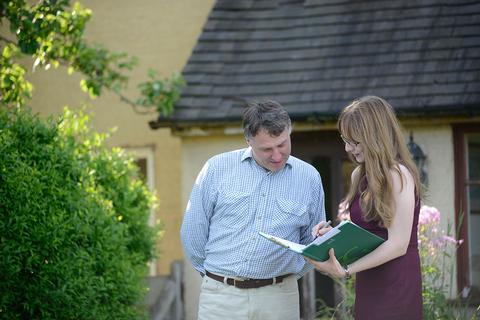Julia Burley


I am an... assistant rural surveyor
You could be an Assistant/Rural Surveyor if you would enjoy:
- Property management including rent reviews and renewals, planned and reactive repairs/improvements, lettings and maintenance.
- Rural business management – generating funds from clients’ assets
- Working with clients and their employees, including landlords, tenant farmers, farm managers, gamekeepers, and housekeepers.
- Assisting with valuations, from individual houses to whole farms.
- Working in a multi-disciplinary firm
- Getting involved with development appraisals and diversification projects - it all depends on what the client wants at the time, which buildings become vacant when, and what funds are available.
- Office work as well as site visits
- Working in a competitive sector with a strong work ethic
- Understanding legislation
- Playing an important part in the rural economy
Since completing her Countryside and Environmental Management degree in 2008 Julia Burley has worked as a land agent and is now an Assistant Rural Surveyor with Smith Gore.
“I’d recommend Harper Adams because it changed the course of my career for the better and will do the same for countless others.”
Julia Burley believes undertaking a year-long placement in industry as part of her BSc (Hons) Countryside and Environmental Management degree course at Harper Adams enhanced her career prospects.
The 30-year-old, who graduated in 2008 before going on to complete a PgD in Rural Enterprise and Land Management at the university, says: “It proved I was employable in my sector and had the practical skills to back up the academic knowledge.”
Julia, who lives in the Derbyshire Dales, said the breadth of subjects covered on the Countryside and Environmental Management course, taught by “experienced staff with a genuine love of teaching”, prepared her for the placement year and her future career.
“I spent my placement at Severn Gorge Countryside Trust as an Assistant Countryside Officer. I assisted the other staff with managing their sites in the Ironbridge Gorge World Heritage Site, learning practical countryside management skills including woodland management, GIS mapping, footpath maintenance and ecological surveys, as well as community engagement. I also did a part-time placement alongside my final year as a trainee deer manager with the Forestry Commission.”
When Julia first left Harper Adams she worked for the Forestry Commission as an Assistant Land Agent before joining Smiths Gore as an Assistant Rural Surveyor in Estate Management and Valuation throughout the Midlands.
“I had to have a Royal Institution of Chartered Surveyors accredited qualification (PgD) to join the firm as a graduate in order to take the Assessment of Professional Competence, but my BSc also demonstrated my academic and practical abilities and accentuated my credentials to prospective employers,” she adds.
“Harper Adams University is known throughout the sector for producing good graduates. A degree from Harper Adams is a badge of honour – employers know they are getting a quality candidate with the right mix of practical ability, technical knowledge and transferable skills.”
More from Julia on her job
“I work for a range of private landowners (traditional rural estates) and institutional clients in estate management. The core of my work is property management, which includes rent reviews, planned and reactive repairs/improvements, lettings and maintenance. I cover residential, agricultural and commercial property. I liaise directly with clients and their employees, including farm managers, gamekeepers, housekeepers, etc. I regularly let out land on either Farm Business Tenancies or grazing licences, carrying out rent reviews and renewals too. Landlord and tenant work forms a significant part of my average week. I also deal with many commercial leases for one of my institutional clients. I assist one of our Partners with valuations, ranging from individual houses to whole farms. I also carry out cottage refurbishment projects, and am currently involved in organising and supervising repairs to some heritage property. As I work in a multi-disciplinary firm, aspects of estate management such as agriculture, forestry and estate agency are dealt with by specialist colleagues, but we all work together as a team and I do have skills in these areas too. In the past I have been involved with development appraisals and diversification projects - it all depends on what the client wants at the time, which buildings become vacant when, and what funds are available.
“Although land agents still have quite a tweedy image, what we really do is rural business management, aiming to generate funds efficiently from our clients’ assets within the parameters of legislation and whatever the individual clients’ objectives are. It requires a very broad knowledge base as well as good people skills. It's great to be out and about on the estates, but a lot of time is spent in the office dealing with the paperwork required to keep up to date with lease renewals, rent reviews, relevant notices, repairs, new lettings and one-off projects. Understanding our own business is important too, as we operate in a competitive sector and we are always aware of providing excellent customer service, fair fees and growing the business. We have a strong work ethic which includes a genuine duty of care to our clients. Other firms may be different, but this definitely isn't a profession for someone who wants to rest on their laurels. Really, we increasingly operate in the same vein as fund and investment managers; we manage assets to generate income, but as we operate in the countryside we do this in the context of our communities, history, regional variations and public perception. It's an interesting and complex job and challenging as legislation is always changing and we live in an increasingly transparent world. But it is very rewarding, particularly helping clients and seeing that you have made a difference. It's also great to play a part in the rural economy.”




